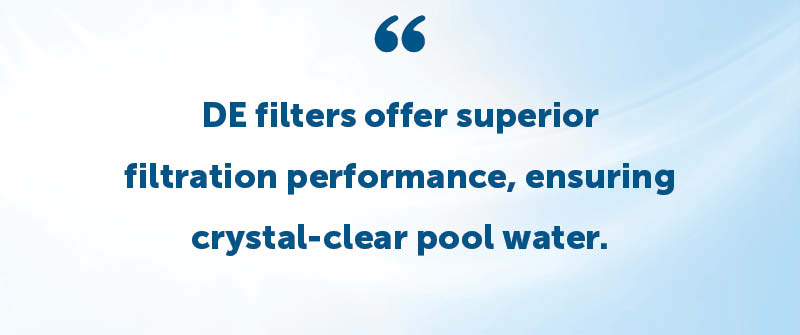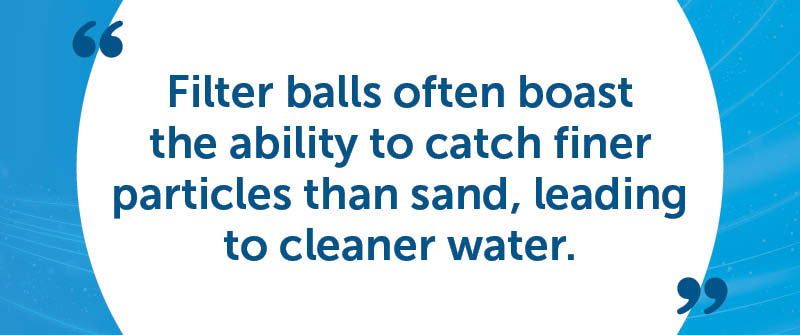An Overview of Different Filter Types: Cartridge, Sand, and DE Filters
Choosing the right filter system for your above-ground pool is essential for maintaining clean and safe water. There are three main types of filter systems to consider: cartridge filters, sand filters, and DE (diatomaceous earth) filters. Each type of pool filter has unique features, benefits, and considerations based on your specific needs and pool setup.
Cartridge filters are generally easy to maintain and are known for their efficient filtration capabilities, capturing debris as small as 10-15 microns. On the other hand, sand filters, a popular choice due to their low maintenance and durability, clean particles to around 20-40 microns, making them slightly less precise. DE filters are exceptional for offering the highest level of filtration by removing particles as small as 3-5 microns, though they require more upkeep.
Advantages Of Cartridge Filters For Above-Ground Pools
Cartridge filter systems are particularly advantageous for above-ground pools due to their ease of use and maintenance. Cleaning a cartridge filter involves merely rinsing it with a hose, eliminating the backwashing needed with sand filters. These systems utilize a two-piece tank housing a filter cartridge that effectively traps debris while allowing clean water to return to the pool. They are ideal for pool owners seeking hassle-free operation and are often the best cartridge filters for above-ground pool owners looking for an effective and economical solution.
Benefits Of DE Filters And How They Work
DE filters offer superior filtration performance, ensuring crystal-clear pool water. Unlike other filters, DE filters use a white powder that coats grids within the filter tank, trapping even the finest particles. This type of filter is perfect for those who prioritize the clearest water and are prepared for the more involved maintenance routine. Their ability to maintain water clarity and quality makes them a premium choice for anyone dealing with challenging pool conditions.

Is A Sand Filter Better Than A Cartridge Filter For An Above-Ground Pool?
When it comes to managing your above-ground pool, selecting the right filter system is crucial for water clarity and overall maintenance. Two popular options are sand filters and cartridge filters, each with its own set of advantages and drawbacks. Let’s explore these options to determine which might be the most suitable for your specific needs.
Comparison Of Sand And Cartridge Filters
What pool filter is better, sand or cartridge? Sand filters work by pushing water through a bed of special-grade sand, which traps particles and debris. On the other hand, cartridge filters use a pleated synthetic polyester material, known as a filter cartridge, to capture debris. Sand filters are effective at filtering out particles down to 20-40 microns. However, cartridge filters tend to be more precise, capturing particles as small as 10-20 microns, which means they can provide cleaner water.
Pros And Cons: Maintenance, Cost, And Efficiency
Maintenance is a key consideration. A pressure gauge is essential for monitoring when maintenance is required for both sand and cartridge filters. Sand filters require periodic backwashing to clean the sand bed, which can be labor-intensive and increase water usage. Cartridge filters, conversely, require more frequent but simpler maintenance. They need to be washed with a garden hose and occasionally replaced, which can be easier for many homeowners.
In terms of cost, sand filters tend to be more affordable initially. However, the long-term costs of increased water usage for backwashing should be considered. Cartridge filters have a higher upfront cost but can be more cost-effective over time with less water waste. Finally, in terms of efficiency, while sand filters are robust and durable, cartridge filters offer superior water clarity due to their finer filtration capabilities.
Suitability For Different Pool Sizes And Usages
For pool owners who prioritize easy maintenance and have smaller pools, cartridge filters might be more suitable. They are efficient, easy to clean, and tend to operate with less effort from the pool owner. On the other hand, sand filters might be ideal for larger above-ground pools or settings where the increased maintenance can be managed feasibly.
Ultimately, while the choice between a sand or cartridge filter will depend on individual priorities — including cost, maintenance willingness, and desired water clarity—both types offer distinct benefits for above-ground pools. It’s beneficial to evaluate which aligns best with your lifestyle and pool usage.
Are Filter Balls Better Than Sand?
Understanding Filter Balls And Sand As Filtering Mediums
For homeowners considering the best above-ground pool filter, deciding between traditional sand and innovative filter balls can be an important consideration. Filter balls are a relatively new innovation designed to offer a lighter and more efficient alternative to sand. They consist of small, lightweight balls that are easy to handle, allowing for simple installation and maintenance. On the other hand, sand has been a long-standing choice for pool filtration systems because of its ability to effectively trap debris and impurities. Both options provide efficient filtration, though filter balls might offer a slight edge in longevity and ease of maintenance compared to filter sand.
Effectiveness In Filtration And Ease Of Handling
When it comes to filtration effectiveness, filter balls often boast the ability to catch finer particles than sand, leading to cleaner water. This feature is a significant advantage for pool owners seeking pristine pool conditions. Furthermore, the ease of handling these lightweight balls compared to heavy bags of sand cannot be overstated. Transitioning to filter balls is generally easier, with less manual labor involved.

Environmental Impacts And Longevity
From an environmental standpoint, filter balls are reusable and eco-friendly. They can often last up to five years before needing replacement, which reduces waste when compared to sand, which needs changing every few years to maintain efficiency. However, sand’s natural properties make it easier to dispose of in an environmentally responsible manner once replaced. Both options provide efficient filtration, though filter balls might offer a slight edge in longevity and ease of maintenance.
For homeowners prioritizing ease of use and superior filtration technology, filter balls present a modern and effective solution. Their application in pool maintenance could simplify the process and make it more environmentally conscientious, aligning perfectly with contemporary efforts to reduce ecological footprints. By switching to filter balls, homeowners can enjoy a cleaner pool with less hassle, reinforcing their choice for a high-quality above-ground pool filter.
What Is Better, A Sand Filter Or A DE Filter?
In-Depth Comparison Between Sand And DE Filters
For above-ground pool owners, selecting the right filter is crucial to maintaining crystal-clear water. When comparing ground pool filter systems like sand filters and DE filters, it’s important to weigh their benefits against your pool’s specific needs. Sand filters work by running water through a bed of sand, trapping debris and particles ranging from 20 to 40 microns. They’re known for their simplicity and ease of use, making them a popular choice for many pool owners.
On the other hand, DE filters, which utilize diatomaceous earth, are considered the gold standard for pool filtration. They filter out smaller particles, as small as 5 microns, providing superior water clarity. This enhanced filtration makes DE filters a favorite for those who prioritize top-notch water quality. However, DE filters involve more maintenance, including regular backwashing and replenishing the DE powder.
Filtration Quality And Maintenance Requirements
While DE filters provide exceptional filtration quality compared to sand filters, they also demand more maintenance. DE filters need to be backwashed more frequently, and the DE powder should be replaced regularly. In contrast, sand filters require less frequent backwashing and their sand only needs replacement every 5 to 7 years, offering lower maintenance overall.
However, it’s essential to consider that the superior filtration of DE filters ensures the removal of finer particles and debris, which might be worth the extra effort for those aiming for near-flawless water clarity.
Cost Considerations And Setup Complexity
Cost is an important factor for any homeowner. Sand filters generally come with a lower upfront cost and are simpler to install, making them an attractive option for those with a tighter budget or limited technical expertise. DE filters, although initially more expensive and involving a more complex setup, can be viewed as a long-term investment due to their superior filtration capabilities.
Overall, deciding whether a sand or DE filter is better depends on your specific needs, budget, and willingness to engage in regular maintenance.
Unlock exceptional pool clarity with DiscountFilters.com‘s wide range of high-quality pool filters. Experience easy installation and maintenance while enjoying superior filtration and affordable prices. Browse our selection today and ensure your above-ground pool remains inviting all season long.

